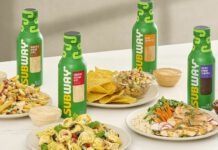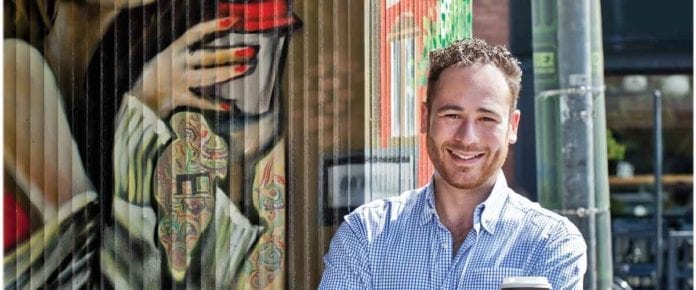In Toronto’s already crowded coffeehouse space, Aroma Espresso Bar is taking the city by storm. Launched in the city’s Annex neighbourhood in 2007, Aroma now boasts 30 locations across the Greater Toronto Area (GTA).
“It’s an impressive rate of growth when you consider the economic downturn that happened at the time the first Aroma location opened, and the fact that after opening the first store [the owners] waited two years before opening another location,” says Daniel Davidzon, manager, Marketing and Communications for Aroma Espresso Bar.
Founded in Jerusalem in 1994 by Yariv Shefa, Aroma Espresso Bar immediately captured the imagination of the Israeli population. The brand grew quickly across the country and today it is considered the Starbucks or Tim Hortons of Israel.
Fast forward a couple of years to 2001 when Davidzon’s cousin Anat Davidzon arrived in Toronto to study at the University of Toronto. She quickly began to miss the coffeehouses of her homeland and so she approached Aroma’s owners in Israel and asked them if they had considered expanding into Canada.
“The vision for Aroma Espresso Bar in Canada has always been to deliver fresh and nutritious meal options alongside superior coffee,” says Anat Davidzon, managing partner, Aroma Espresso Bar Canada. “Before opening our first store, I knew there was a void in the marketplace — Toronto did not have a casual, fast-service restaurant like this. As a stronger focus on health and nutrition developed in the consumer consciousness, we were prepared to establish Aroma as a leading player in that market and continue to do so.”
To help her in the quest to bring Aroma to Canada, Davidson partnered with Earl Gorman, a Toronto-based businessman and together they purchased the Canadian rights to the franchise before opening the Annex location. Each country’s branch of Aroma operates independently, although there is room for collaboration and co-opting of ideas, designs and menu items.
So what makes Aroma stand out in a sea of Tim Hortons, Starbucks and Second Cup cafes? “There are a number of pillars of quality that we feel differentiate us from our competition or from organizations that people would deem our competition,” says Daniel Davidzon. “We pride ourselves on fast service and aim to get people their meal within seven minutes of ordering. That can present a challenge since every location has a full kitchen and we make everything from scratch.”
Along with the fast service comes a promise of quality, he says. Everything is fresh and made in-house daily. The commitment to fresh, wholesome ingredients is a common theme in all 175 Aroma Espresso Bar locations around the world. Stores in Canada, the U.S., Israel, Ukraine, Romania and Kazakhstan serve a combined 25 million customers a year.
“Even though they are in the middle of the desert, Israel actually does a really great job of agriculture and has developed a lot of technologies and ways of working around their climate to be able to produce great dairy, fruits and vegetables,” says Daniel Davidzon. “That commitment to wholesome fresh ingredients is very innate in the Israeli people.”
Aroma’s Canadian stores source as much of its ingredients locally as possible. “Our produce is delivered fresh each day from local suppliers,” states Daniel Davidzon. “We have a bakery in Israel that produces most of our breads and pastries and sometimes we get the recipes from them and find someone locally to make them. This saves on delivery costs, carbon footprint and it allows us to keep the money in the local economy when we can.”
Aroma’s carefully considered menu items are specifically created for the Canadian palate. “If you went to an Aroma in the U.S. (Aroma opened its first U.S. location in N.Y. in 2006) you would find a lot of food on the menu that you wouldn’t find in Canada and vice versa because of the different taste preferences,” he says. “We work with our chefs in Israel to help develop menu items for us. But often we’ll come up with ideas of our own at head office and then we’ll do our best to make it work amongst ourselves using the knowledge we have. If that doesn’t take us far enough, we’ll reach out to either one of our local chefs or a chef that works for Aroma around the world and ask them for help to develop the recipe further.”
In fact, three new items launched last year were developed in Canada: the Aroma A.C.E. sandwich made with avocado spread, grilled chicken, fried egg, arugula and Aroma sauce ($5.95 for a personal size), the fig jam and goat cheese croissant ($5.95) and the wildly popular Freekeh salad ($7.95).
“We constantly explore underserved health trends to see whether there is a fit with our menu,” says Daniel Davidzon. “Our Freekeh salad is one result of that. We felt it was very much in line with our values, and once we identified freekeh as a key nutritious ingredient, we then had to create a menu item around it while also considering operational capabilities.” Freekeh is a Middle Eastern grain predicted to be what quinoa was five years ago.
“It was important for us to get ahead of that trend,” he says. “We worked with a local chef who came up with a couple of recipes for us that we tested. The final product has quickly become one of our best-selling salads and although it was launched as a seasonal item, it’s going to end up as a permanent menu item. I wouldn’t be surprised if you see it pop up at Aromas in Israel or New York.”
With its varied menu of delicious goodies, it’s easy for consumers to get caught up in the food side of Aroma. But remember this is a coffeehouse. “We’re pretty focused on brewing a great cup of coffee,” says Daniel Davidzon. “We have an espresso blend, a cappuccino blend, a brewed coffee blend and a decaf blend.” The company plans to release a fifth, dark roast blend in the new year. “Our focus is on having only a few blends of coffee and letting people enjoy them without inundating them with too many choices.”
The company sources beans from South America and India as well as in Asia and Europe. It also has an exclusive facility in Israel that roasts beans for all of its units around the world.
Interestingly, when it came time to source teas, Aroma looked closer to home. “We work with Pluck Teas in Toronto who deal in organic, ethically sourced and locally blended teas. The looseleaf teas that we have in stores right now are actually exclusive blends made just for Aroma.”
For those looking for something a bit stronger, eight Aroma Espresso Bar locations are licensed, with a Signatures drinks menu featuring a selection of hot and cold drinks that can be spiked with vodka, rum or Baileys. While the baristas suggest pairings, customers can also customize their own drinks. These locations also stock wine and beer.
“We have a store in Niagara that works with local wineries to showcase their wines — the wineries are lining up to partner with Aroma because of the exposure it brings to their brand,” says Daniel Davidzon.
The alcohol licensing of an Aroma Espresso Bar is at the discretion of the individual franchisee.
Setting the Scene
In terms of store decor, Aroma prides itself on keeping it simple. “We strive to make sure the ambiance in the stores is more upscale than people might expect, with a certain element of class and elegance. We try to be modern and minimalist and stick to a simple black, white and red colour palette so there is a flow and harmony in every store. We use local photography in-store whenever possible to establish a stronger connection with the neighbourhood. Customers often comment on the sleek style of our stores and the minimalist aspect places more focus on the food and drinks — ultimately, it’s about what’s on your plate.”
When it comes to size, it’s determined by location. But, on average, each unit features about 20 seats. All locations are either stand-alone or corner units with an average footprint of 2,000 square feet. Aroma employs 500 people across Ontario, with approximately 15 staff per store.
A Competitive Edge
“We feel the general public sees our competition as being companies like Tim Hortons, Starbucks or Second Cup but we also consider organizations like Panera or, on a much smaller scale, La Prep or Pumpernickel’s. A major differentiator is the full operational kitchen in every store,” says Daniel Davidzon. “That’s not something all our competition can brag about.”
Every Aroma Espresso Bar in Canada is franchised, a business model Daniel Davidzon feels increases its level of service. “Our owners are fully invested in the brand; they are there every day — they don’t just invest money and walk away. So when you go to an Aroma, most of the time you’ll find the owner working in the store. It increases customer loyalty and adds a community connection. The owners have a vested interest in making sure the location does well.”
According to Doug Fisher, foodservice and franchise consultant and president of Toronto-based FHG International, Aroma is “blowing everyone out of the market” with its business model.
“I think they have it pretty dead on,” says Fisher. “They didn’t get stuck in the coffee bar concept like everyone else; they also allowed for a great line of smoothies as well as hot and cold food fresh to order. They brought a lot of life into the operation with that. They may have the best coffee in the market — it’s outstanding.” Although Fisher says Aroma may be a little pricey, given its growth, volume and turnover it doesn’t seem to be a deterrent.
“It’s value at a certain price and it seems to be the perception of a lot of people that it’s worth spending the extra dollar or two in order to have the quality Aroma is putting out. From that perspective it’s a well-executed, well-run concept.”
In terms of customer demographics Daniel Davidzon says, “it’s a tough one to nail down. It changes from store to store and we see a proliferation of all sorts of people — from young urban professionals, to families in the suburbs, to older clientele and everything in between.”
Whether Aroma will be successful in lower-income neighbourhoods remains to be seen, says Fisher, and that may set a limit on what the company can achieve in the GTA.
When opening a new store, Aroma Canada looks for visibility, preferring to locate near new developments. “We’re continuing to expand in the GTA but we’re moving outside that area as well because we’re getting a lot of requests. Our immediate future sees us expanding further across Toronto and Southern Ontario and we are opening our first store outside the GTA in Ottawa in early fall.”
“That’s the right way to grow,” says Fisher. “Find where you’re going to start, build stores, create the presence and create the brand like they’ve done — start making noise and grow out from there.” l


















